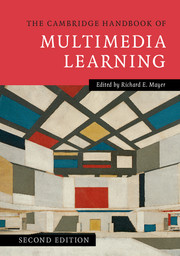Book contents
- The Cambridge Handbook of Multimedia Learning
- The Cambridge Handbook of Multimedia Learning
- Copyright page
- Contents
- Contributors
- Preface
- Acknowledgments
- 1 Introduction to Multimedia Learning
- Part I Theoretical Foundations
- Part II Basic Principles of Multimedia Learning
- Part III Advanced Principles of Multimedia Learning
- 15 The Guided Discovery Learning Principle in Multimedia Learning
- 16 The Worked Examples Principle in Multimedia Learning
- 17 The Self-Explanation Principle in Multimedia Learning
- 18 The Generative Drawing Principle in Multimedia Learning
- 19 The Feedback Principle in Multimedia Learning
- 20 The Multiple Representation Principle in Multimedia Learning
- 21 The Learner Control Principle in Multimedia Learning
- 22 Animation Principles in Multimedia Learning
- 23 The Collaboration Principle in Multimedia Learning
- 24 The Expertise Reversal Principle in Multimedia Learning
- 25 The Individual Differences in Working Memory Capacity Principle in Multimedia Learning
- Part IV Multimedia Learning of Cognitive Processes
- Part V Multimedia Learning in Advanced Computer-Based Contexts
- Author Index
- Subject Index
18 - The Generative Drawing Principle in Multimedia Learning
from Part III - Advanced Principles of Multimedia Learning
Published online by Cambridge University Press: 05 August 2014
- The Cambridge Handbook of Multimedia Learning
- The Cambridge Handbook of Multimedia Learning
- Copyright page
- Contents
- Contributors
- Preface
- Acknowledgments
- 1 Introduction to Multimedia Learning
- Part I Theoretical Foundations
- Part II Basic Principles of Multimedia Learning
- Part III Advanced Principles of Multimedia Learning
- 15 The Guided Discovery Learning Principle in Multimedia Learning
- 16 The Worked Examples Principle in Multimedia Learning
- 17 The Self-Explanation Principle in Multimedia Learning
- 18 The Generative Drawing Principle in Multimedia Learning
- 19 The Feedback Principle in Multimedia Learning
- 20 The Multiple Representation Principle in Multimedia Learning
- 21 The Learner Control Principle in Multimedia Learning
- 22 Animation Principles in Multimedia Learning
- 23 The Collaboration Principle in Multimedia Learning
- 24 The Expertise Reversal Principle in Multimedia Learning
- 25 The Individual Differences in Working Memory Capacity Principle in Multimedia Learning
- Part IV Multimedia Learning of Cognitive Processes
- Part V Multimedia Learning in Advanced Computer-Based Contexts
- Author Index
- Subject Index
Summary
This chapter discusses the generative drawing principle in multimedia learning. It proposes that asking students to create drawings while reading text causes generative processing that leads to better learning outcomes. In drawing, students have to translate the verbal text information into a picture that represents spatial relationships among functional elements referred to in the text. Asking students to draw a picture of the text content as they read a text encourages them to actively engage in deep cognitive and metacognitive processing and thus fosters deep understanding of the material to be learned. The generative drawing principle has been supported by several studies, especially when students engage in hand drawing using paper and pencil. An important logistical issue for instructional designers when using the drawing strategy is to create a form of drawing activity that minimizes the creation of extraneous cognitive processing, by providing appropriate support for drawing. Otherwise the benefits of drawing can be diminished, as the intended generative cognitive processes can be impaired or even impeded by extraneous cognitive load caused by the mechanics of drawing, leading to insufficient cognitive recourses available for generative processing.
Keywords
- Type
- Chapter
- Information
- The Cambridge Handbook of Multimedia Learning , pp. 433 - 448Publisher: Cambridge University PressPrint publication year: 2014
- 33
- Cited by

